人教版英语选修8 Unit3 全单元教案
- 格式:doc
- 大小:93.50 KB
- 文档页数:12
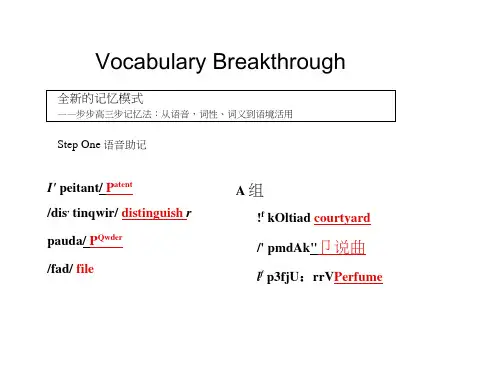
Vocabulary BreakthroughStep One语音助记I' peitant/ P atent/dis, tinqwir/ distinguish r pauda/ P Qwder/fad/ file A组!f kOltiad courtyard/' pmdAk"卩说曲l f p3fjU:rrV Perfume/kjU:b/ cubel f kO:Jn/caution_ /siz/ seizel f vaelld/ valid/stnrV string/df rektan/ directory r daial/ dialStep Two词性、词义助记A组仁慈的mercy n f merciful•stain n. f stainless MZ•没有污点的expect © ).expectation期望freeze v.—freezi ng仇伉冰冻的identity n. -►identification鉴定head n ・ f forehead n.额头practice n. -► practical adj.实际的person t 2. —► pers onnel n.人力资源B组sudden adj.^abrupt M/.近义词positive adjL passive a龙•反义词happy adi.f merry同义词guilty adi.f innocent仇伉反义词stand v.—bear p. 同义词energetic adj.f dynamic a"•同义词pat v.tap c.同义词present 仇伉―current仇伉同义词C组能力;胜任//.competence 版本;译本〃.versi on 扩大;延伸extension法庭court 联想pt associate 方便的收con venie nt 三角形“.triangle 冰箱n.refrigerator 稳固的仇di.stable(评判的)标准H.criterionStep Three语境助记书写上档次卷面增分数1.背诵经典I tried calling you up several times but I couldn^ t getthrough.规范默写2.背诵经典Each product hasidentification.规范默写a number for easy3.背诵经典I checked the files and some of the papers were out oforder.规范默写4.背诵经典I,11 ring back at a more convenient time. 规范默写5.背诵经典The helicopters appeared as two black dots on thehorizon.规范默写。
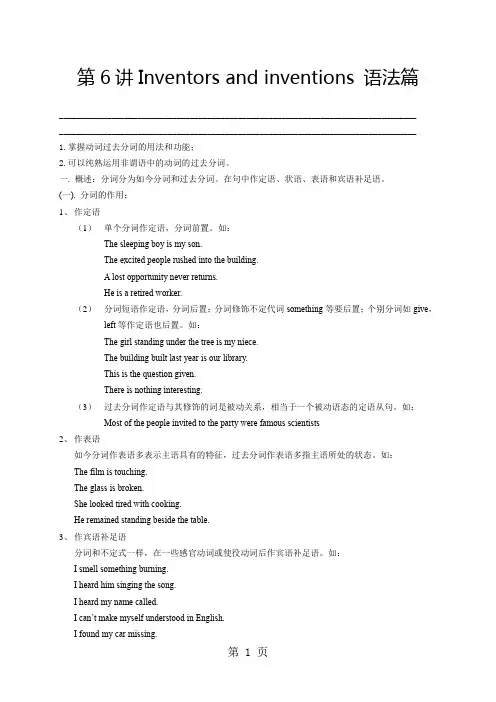
第6讲Inventors and inventions 语法篇____________________________________________________________________________________________________________________________________________________________________1.掌握动词过去分词的用法和功能;2.可以纯熟运用非谓语中的动词的过去分词。
一. 概述:分词分为如今分词和过去分词。
在句中作定语、状语、表语和宾语补足语。
(一). 分词的作用:1、作定语(1)单个分词作定语,分词前置。
如:The sleeping boy is my son.The excited people rushed into the building.A lost opportunity never returns.He is a retired worker.(2)分词短语作定语,分词后置;分词修饰不定代词something等要后置;个别分词如give,left等作定语也后置。
如:The girl standing under the tree is my niece.The building built last year is our library.This is the question given.There is nothing interesting.(3)过去分词作定语与其修饰的词是被动关系,相当于一个被动语态的定语从句。
如:Most of the people invited to the party were famous scientists2、作表语如今分词作表语多表示主语具有的特征,过去分词作表语多指主语所处的状态。
如:The film is touching.The glass is broken.She looked tired with cooking.He remained standing beside the table.3、作宾语补足语分词和不定式一样,在一些感官动词或使役动词后作宾语补足语。
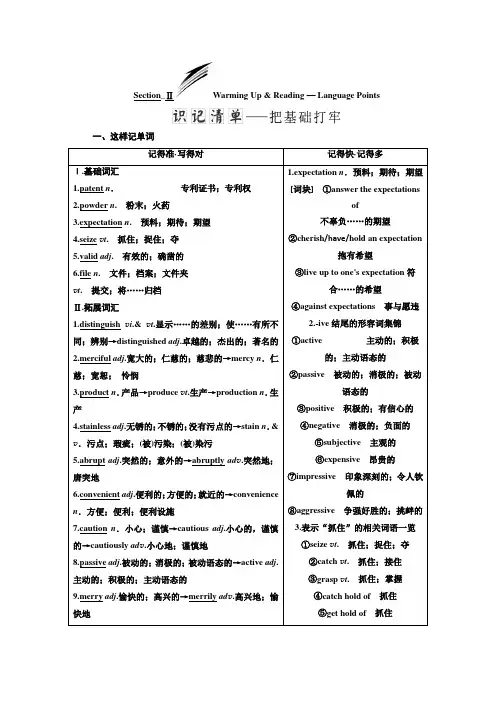
Section_ⅡWarming Up & Reading — Language Points二、这样记短语三、这样记句式1.(教材P20)When I called up my mother in the countryside on the telephone she was very upset.我给住在乡下的母亲打电话的时候,她感到很心烦。
call up 给……打电话;使……回忆起这欢笑声让他回忆起了他的童年。
②The government calls on the youth to donate their blood voluntarily.政府号召青年义务献血。
③I will call for you at 8 o'clock at the school gate.我8点钟在学校门口接你。
[名师点津]与“打电话”有关的常用表达:2.(教材P20)Snakes come near the house now and then, and they seem to have made their home here, not far from the walnut tree.蛇时不时地爬到屋子边上来,似乎是在屋子附近离胡桃树不远的地方安家了。
now and then 偶尔;有时①We haven't seen each other for years, but we chat online now and then.我们已有多年未见过面了,但是我们有时会在网上聊天。
②At_times I feel that I want to leave this job.有时我真想辞职。
③You can hear people fall about laughing once_in_a_while during the show.演出期间不时传来观众的笑声。
3.(教材P20)Here was a chance for me to distinguish myself by inventing something merciful that would catch snakes but not harm them.这回我有机会来表现一下自己了。

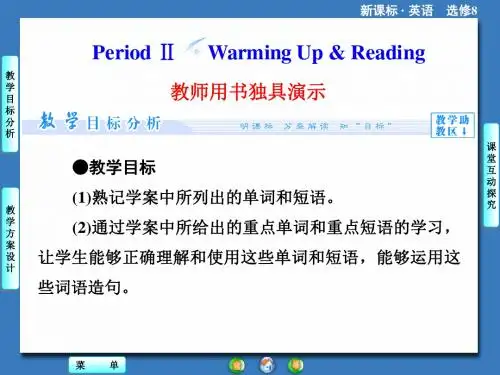
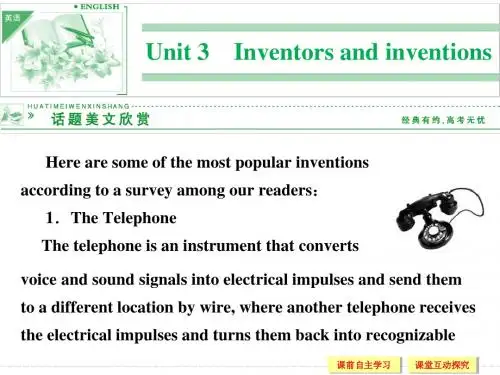
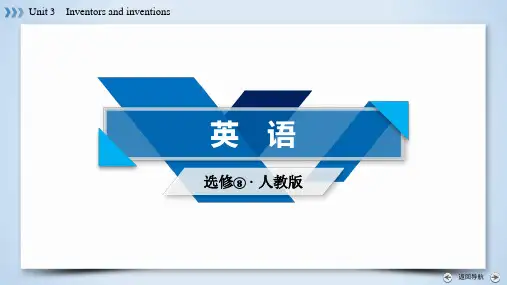

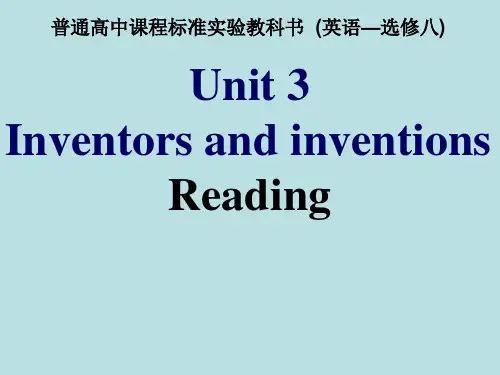
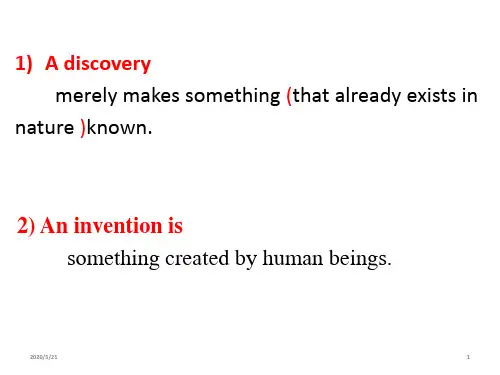
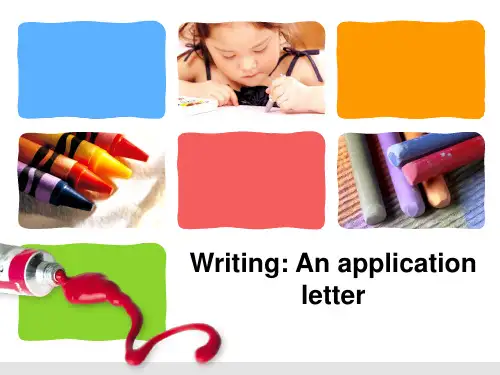
1 Unit 3 Inventors and inventions The First Period Reading Teaching goals教学目标 1. Target language目标语言 a. 重点词汇和短语 patent, distinguish, product, power, perfume, cube, abrupt, abruptly, convenient, expectation, monitor, passive, criterion, valid, application, file, rod, call up, now and then, set about, in case 2. Ability goals Enable the students to describe the problem of the snakes and what has been done by the writer to solve the problem. 3. Learning ability goals Help the students to learn how to retell the story and how to meet the requirements of getting a patent. 4. Emotional goals Make the students try to be good at discovering some useful things and realize that it’s not easy to get a patent. Teaching important points 教学重点 To get the main idea of the whole passage and each parts. Teaching difficult points 教学难点 Learn how to meet the requirements of getting a patent. Teaching methods 教学方法 Reading and Task-based activities. Teaching procedures & ways教学过程与方式 Step Ⅰ warming up Deal with the part of warming up and ask the students to find out the definitions of discovery and an invention, and their differences. An invention is something that is created by a human being, such as the lightning rod. To the contrary, a discovery merely makes known something that already existed in nature, such as the discovery on the New Continent by Columbia. Step Ⅱ Pre-reading 2
Ask the students to discuss in groups and work out a suitable order for the list of how people get their invention approved. 1. Finding a problem 2. Doing research 3. Thinking of a creative solution 4. Testing the solution 5. Deciding on the invention 6. Applying for a patent Step Ⅲ While-reading Task 1: Get the students to comprehend the passage carefully and accurately to find out the main idea of the passage, and then divide the text into several parts and work out the main idea for each paragraph. Main idea: The text is mainly about the author’s experience in helping her mother get rid of the snakes and applying for the patent for her invention. Part I (Para.1): the discovery of the problem of the snakes Part II (Paras.2-3): the research on the approaches to solve the problem Part III (Paras.4-6): the attempts to catch the snakes Part IV (Paras.7-8): the requirements of getting a patent Task 2: go through the whole text again and finish Exercise 1 on page 21. Step Ⅳ Post-reading Ask the students to think of 2 questions. 1. What should we learn from this text? 2. What’s the writing purpose of the writer? 1. We can learn from the text the way of doing scientific researches and how to apply for a patent. We can also learn that it takes an inventor great determination and persistence to achieve his or her ambition in life. 2. The writer wants to inform us of the scientific methods to solve present problems so that we students can not only broaden the horizons but become more skilled in discovering and considering carefully the problems in daily life. We are also encouraged by the writer to be creative and hardworking as well as thinking independently. Step Ⅴ Homework 1. Go over the whole passage, and try to retell it.2. 能力提升,Jinbang.
The second Period Language points 3
Teaching goals教学目标 1. Target language目标语言 a. 重点词汇和短语 patent, distinguish, product, power, perfume, cube, abrupt, abruptly, convenient, expectation, monitor, passive, criterion, valid, application, file, rod, call up, now and then, set about, in case b. 重点句子 1. The first thing I did was to …, but there only seemed to … 2. Between the outside and the inside walls of the bowl there is some jelly, which freezes when cooled. 3. The criteria are so strict that it is difficult to get new ideas accepted unless they are truly novel. 4. Nor will you receive a patent until a search has been made to find out that your product really is different from everybody else’s. 2. Ability goals Enable the students to master the usage of the new words and expressions and some key sentence structures, and use them in the writing. 3. Learning ability goals Teaching important points 教学重点 How to use the language points Teaching difficult points 教学难点 Try to comprehend some complicated sentence structures Teaching methods 教学方法 Reading, explaining and practicing. Teaching procedures & ways教学过程与方式 Step Ⅰ revision Check their homework, and try to retell the passage briefly. Step Ⅱ language points 1. Pre-reading go through (1)经历(2)通过,成功,成交(3)审阅,检查(4)翻找,查看(5)穿过,通过 Most families went through a lot in the war. 2. do research on /into /in... 从事, 进行, 做研究 They are carrying out a research into the